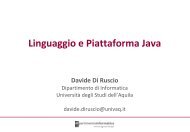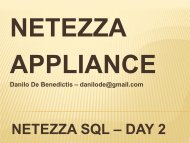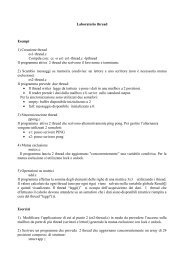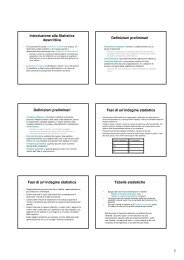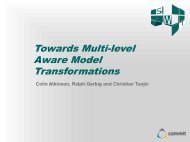Fabio Mercorio's Curriculum Vitae - of Computer Science
Fabio Mercorio's Curriculum Vitae - of Computer Science
Fabio Mercorio's Curriculum Vitae - of Computer Science
Create successful ePaper yourself
Turn your PDF publications into a flip-book with our unique Google optimized e-Paper software.
<strong>Curriculum</strong> <strong>Vitae</strong> a - Dr <strong>Fabio</strong> Mercorio<br />
a Last Update: November 2012<br />
Contact<br />
Information<br />
C.R.I.S.P. Research Centre<br />
University <strong>of</strong> Milano - Bicocca Voice: (+39) 320 8581712<br />
Vialedell’Innovazione10,Room1022-Milano<br />
- Italy<br />
Skype: dannyboodmann<br />
Date <strong>of</strong> Birth: November 6th , 1983 E-mail: fabio.mercorio@unimib.it<br />
Nationality: Italian web: www.di.univaq.it/fabio.mercorio<br />
Current<br />
Position At CRISP Research Centre, Department <strong>of</strong> Statistics, University <strong>of</strong> Milano<br />
- Bicocca<br />
Research Fellow in <strong>Computer</strong> <strong>Science</strong> November 2011 to present<br />
• Supervisor: Pr<strong>of</strong>. Mario Mezzanzanica<br />
• ResearchArea: DataCleansing, DataAnalysisandData QualitythroughFormal<br />
Methods.<br />
Employment<br />
History At CRISP Research Centre, Department <strong>of</strong> Statistics, University <strong>of</strong> Milano<br />
- Bicocca<br />
Education<br />
Visiting Student September 2010 to September 2011<br />
• Supervisor: Pr<strong>of</strong>. Mario Mezzanzanica<br />
• ResearchArea: DataCleansing, DataAnalysisandData QualitythroughFormal<br />
Methods.<br />
At Department <strong>of</strong> <strong>Computer</strong> <strong>Science</strong> , University <strong>of</strong> L’Aquila<br />
Ph.D. in <strong>Computer</strong> <strong>Science</strong> March 2012<br />
• Supervisor: Dott. Giuseppe Della Penna<br />
• Co-Supervisor: Dott. Daniele Magazzeni<br />
• ResearchArea: FormalMethods andArtificialIntelligence, focusing ontheapplication<br />
<strong>of</strong> model checking to deterministic/non-deterministic systems in planning,<br />
control and data quality problems.<br />
• Thesis: Model Checking for the Analysis and Control <strong>of</strong> Complex and Non-<br />
Deterministic Systems<br />
At Department <strong>of</strong> <strong>Computer</strong> <strong>Science</strong> , University <strong>of</strong> L’Aquila<br />
Master degree in <strong>Computer</strong> <strong>Science</strong> October 2008<br />
• Supervisor: Dott. Giuseppe Della Penna<br />
• Co-Supervisor: Dott. Daniele Magazzeni<br />
• Thesis title: Un Planner per domini PDDL+ basato su tecniche di Model Checking<br />
( A PDDL+ planner based on Model Checking Techniques)<br />
• Score: 110/110 cum laude<br />
1 <strong>of</strong> 7
At Department <strong>of</strong> <strong>Computer</strong> <strong>Science</strong> , University <strong>of</strong> L’Aquila<br />
Bachelor Degree in <strong>Computer</strong> <strong>Science</strong> February 2007<br />
• Supervisor: Pr<strong>of</strong>. Guido Proietti<br />
• Thesis title: Algoritmi Distribuiti per il Mantenimento di una Minima Foresta<br />
Ricoprenteinun Grafo( Distributed Algorithms to maitain a Minimum Spanning<br />
Forest in a Graph)<br />
• Score: 107/110<br />
Research<br />
Activity MyresearchinterestsaremainlyinArtificial Intelligence PlanningandData Analysis,<br />
both addressedin my PhD Thesis [15], with particular attention to the application<br />
<strong>of</strong> Formal Methods. My contributions as well as a description <strong>of</strong> my current research<br />
and plans for the next few years are reported in the following:<br />
Artificial Intelligence Planning.<br />
My research activity started by addressing planning and universal planning for<br />
systems with continuous change. Indeed, many realistic planning problems in which<br />
planningcanbeappliedinvolveamixture<strong>of</strong>continuous(possiblynonlinear)anddiscrete<br />
behaviours, also known as hybrid systems. To deal with such kind <strong>of</strong> systems, recently<br />
the AI Planning Community has defined the PDDL+ language which is also able to<br />
capture continuous processes and events.<br />
As a first step, I was co-developer <strong>of</strong> the UPMurphi planner, as presented in [14],<br />
whichperformsplanningbyexploitingtheplanning-as-model-checkingparadigm. Then,<br />
I defined and implemented a formal mapping between the PDDL+ and UPMurphi<br />
semantics, then applying UPMurphi to a number <strong>of</strong> real-world planning applications<br />
(see [2],[11, 13, 12] for details).<br />
The main issue in planning through model checking is the state explosion phenomenon<br />
as the region <strong>of</strong> reachable states is <strong>of</strong>ten huge. To mitigate this problem, I worked to<br />
enrich the UPMurphi planner with a disk-based algorithm, namely the V-UPMurphi<br />
tool (see [15],[5] for details) which allows it to use the disk for storing both the system<br />
dynamics and the final solution, using OBDDs to compress the resulting plans through<br />
the C++ CUDD library.<br />
My research interest also investigates the planning in non-deterministic domains.<br />
Indeed, while in classical planning a plan always reaches a goal, in non-deterministic<br />
domains an action may have several outcomes, which could make the plan unable to<br />
reach a goal. The concept <strong>of</strong> strong plan fills this gap by ensuring that a plan always<br />
achieves a goal regardless <strong>of</strong> the non-determinism. In this field, I have been working<br />
on the development and analysis (proving correctness, completeness and complexity)<br />
<strong>of</strong> an algorithm which, as a novel contribution, (1) considers a R + cost function looking<br />
for cost-optimal strong plans; (2) extends the synthesis <strong>of</strong> strong planning also to<br />
hybrid and/or nonlinear domains (see [9] for details). I implemented the cost-optimal<br />
strong planning algorithm on the top <strong>of</strong> V-UPMurphi tool, namely the SUPMurphi<br />
tool, applying it to some motivating non-deterministic domains [5].<br />
A complete summary <strong>of</strong> this part <strong>of</strong> my work has been accepted for the publication [3].<br />
Data Analysis.<br />
Business and governmental applications, web applications, ongoing relations between<br />
citizens and public administrations generate a lot <strong>of</strong> data, many <strong>of</strong> which can be considered<br />
as longitudinal data (i.e., repeated observation <strong>of</strong> the same object along the time).<br />
Such data are <strong>of</strong>ten used in several decision making activities as evaluation <strong>of</strong> active<br />
policies, resource allocation, service design and improvement. However, the lower the<br />
2 <strong>of</strong> 7
Teaching<br />
Students<br />
Supervision<br />
quality <strong>of</strong> the data, the lower the effectiveness <strong>of</strong> the statistics derived from it. Hence,<br />
data quality analysis and cleansing activities became required tasks before the decision<br />
making process.<br />
Given my background on Model Checking, as a first contribution I addressed the problem<br />
<strong>of</strong> the data quality verification <strong>of</strong> databases as a model checking problem.<br />
In this settings, a solution for the latter (if any) represents a data quality problem for<br />
the former. I extended the application <strong>of</strong> model checking by defining the Robust Data<br />
Quality Analysis, a technique to support and improve existing cleansing activities, applying<br />
it to the CO System <strong>of</strong> the Italian Labour Market Domain studied at the CRISP<br />
Research Centre (see [10],[6]).<br />
Since Model Checking is well suited to explore huge state spaces, I have been workingto<br />
perform a sensitivity analysis on the cleansed data. The impact that the cleansing<br />
process may have on the aggregate indicators computed on the cleansed data is investigated<br />
by considering all the alternative cleansed versions <strong>of</strong> the original dirty data.<br />
The results can be seen as a confidence interval about the reliability <strong>of</strong> the computed<br />
indicator (see, e.g. [7]).<br />
Recently, I inherited the concept <strong>of</strong> AI universal planning by defining the universal<br />
cleanser: a repository <strong>of</strong> all the feasible actions able to cleanse a dirty data. It is<br />
automatically synthesised <strong>of</strong>f-line on the basis <strong>of</strong> the UPMurphi algorithm. As a characteristic,<br />
it is domain-dependent, i.e. it can deal only with database data conforming<br />
to the model that generated it, but data-independent since, once computed, it can be<br />
used to cleanse any dataset conforming to the model [8].<br />
At Master in Business Intelligence and Decision Support, University <strong>of</strong> Milano-Bicocca<br />
Lecturer about Data Analysis, academic year 2011/2012.<br />
At Department <strong>of</strong> Statistics , University <strong>of</strong> Milano-Bicocca<br />
Teaching Assitent, academic years 2011/2012 and 2012/2013.<br />
• Informatica at Course <strong>of</strong> Statistics - Faculty <strong>of</strong> Statistics <strong>Science</strong> - University <strong>of</strong><br />
Milano-Bicocca<br />
• Laboratorio di Informatica at Course <strong>of</strong> Statistics - Faculty <strong>of</strong> Statistics <strong>Science</strong><br />
- University <strong>of</strong> Milano-Bicocca<br />
At Department <strong>of</strong> <strong>Computer</strong> <strong>Science</strong> , University <strong>of</strong> L’Aquila<br />
Teaching as lecturer, academic years 2008/2009 and 2009/2010.<br />
• Advanced invariants modelling using Linear Temporal Logic and Computational<br />
Tree Logic (LTL, CTL, and CTL*), at Formal Methods for Complex Systems<br />
Verification course<br />
• Introduction to The SPIN model Checker, at Formal Methods for Complex Systems<br />
Verification course<br />
Co-supervised Bachelor’s theses:<br />
• FrancescoScoccia. Planning con Algoritmi Genetici (Jointly supervised with Dr.<br />
Giuseppe Della Penna). December 2010.<br />
3 <strong>of</strong> 7
Research<br />
S<strong>of</strong>tware<br />
Developed<br />
Publications<br />
*<br />
*<br />
• FrancescoAntonelli. Controllo automatico di unapparato di sollevamento idraulico<br />
per installazioni antisismiche (JointlysupervisedwithDr. GiuseppeDellaPenna).<br />
March 2010.<br />
• Luigi Grassano. Pianificazione di un processo di produzione chimica tramite tecniche<br />
di planning basate su model checking (JointlysupervisedwithDr. Giuseppe<br />
Della Penna). October 2009.<br />
• UPMurphi: The Universal Planner Murphi tool representsa computational engine<br />
to support universal planning for possibly nonlinear Discrete Time Hybrid Systems<br />
defined with a PDDL+ model. We provided a formal mapping process which translates<br />
a PDDL+ model into a semantically equivalent UPMurphi model. The tool<br />
translates PDDL+ models into UPMurphi models and then outputs a collection <strong>of</strong><br />
optimal plans according to the PDDL+ syntax. Moreover, UPMurphi is able to validate<br />
(using the standard PDDL+ VAL validator) all the generated plans. Related<br />
Publications:[15],[14, 11, 12, 13][2, 4, 3].<br />
• V-UPMurphi: It is a computational engine to enhance the ability <strong>of</strong> UPMurphi to<br />
synthesise plans and universal plans for (possibly nonlinear) Discrete Time Hybrid<br />
Systems defined with a PDDL+ model. V-UPMurphi exploits the use <strong>of</strong> the disk<br />
during the exploration <strong>of</strong> the dynamics. It implements on disk the state space<br />
reduction techniques inherited from Murphi (as bit-compression, hash-compaction)<br />
and allows one to pause and resume the system analysis process, using the disk to<br />
both explore and store the graph <strong>of</strong> the system dynamics. Related Publications:[3,<br />
2][15]<br />
• SUPMurphi: The Strong Universal Planner Murphi implements the Cost Optimal<br />
Strong Plan Algorithm described in j2. It uses the Murphi description language<br />
to model non-deterministic behaviour <strong>of</strong> systems’ actions and, thanks to the use<br />
<strong>of</strong> disk-based algorithm, it is able to address strong planning problems. Then, it<br />
allows one to validate the final strong plan (if any) on the system graph. Related<br />
Publications:[9][3, 5][15]<br />
Journal Articles<br />
[1] GiuseppeDellaPenna,BenedettoIntrigila,DanieleMagazzeni,and<strong>Fabio</strong>Mercorio.<br />
Synthesis <strong>of</strong> cost-optimal strong plans in non-deterministic domains. Applied<br />
Intelligence (under review), 2012.<br />
[2] Giuseppe Della Penna, Daniele Magazzeni, and <strong>Fabio</strong> Mercorio. A universal<br />
planning system for hybrid domains. Applied Intelligence, 36(4):932–959, 2012.<br />
[3] <strong>Fabio</strong> Mercorio. Model checking <strong>of</strong> universal planning in deterministic and nondeterministic<br />
domains. AI Communications (to appear), 2012.<br />
[4] Giuseppe Della Penna, Benedetto Intrigila, Daniele Magazzeni, and <strong>Fabio</strong> Mercorio.<br />
Resource-optimal planning for an autonomous planetary vehicle. International<br />
Journal <strong>of</strong> Artificial Intelligence & Applications (IJAIA), 1(3):15–29,<br />
2010.<br />
Journal Articles (under review)<br />
[5] GiuseppeDellaPenna,BenedettoIntrigila,DanieleMagazzeni,and<strong>Fabio</strong>Mercorio.<br />
Synthesis <strong>of</strong> cost-optimal strong plans in non-deterministic domains. Applied<br />
Intelligence (under review), 2012.<br />
4 <strong>of</strong> 7
*<br />
*<br />
International<br />
Schools and<br />
Conferences<br />
[6] Mario Mezzanzanica, Roberto Boselli, Mirko Cesarini, and <strong>Fabio</strong> Mercorio. Longitudinal<br />
data consistencyverificationusing formal methods. International Journal<br />
<strong>of</strong> Information Quality (under review), 2012.<br />
Referred Conference Papers<br />
[7] Mario Mezzanzanica, Roberto Boselli, Mirko Cesarini, and <strong>Fabio</strong> Mercorio. Data<br />
quality sensitivity analysis on aggregate indicators. In Markus Helfert, Chiara<br />
Francalanci, and Joaquim Filipe, editors, DATA 2012 - Proceedings <strong>of</strong> the International<br />
Conference on Data Technologies and Applications, pages 97–108.<br />
SciTePress, 2012.<br />
[8] Mario Mezzanzanica, Roberto Boselli, Mirko Cesarini, and <strong>Fabio</strong> Mercorio. Towards<br />
the use <strong>of</strong> model checking for performing data consistency evaluation and<br />
cleansing. In The 17th International Conference on Information Quality (ICIQ<br />
2012) (to appear), 2012.<br />
[9] Giuseppe Della Penna, Benedetto Intrigila, Daniele Magazzeni, <strong>Fabio</strong> Mercorio,<br />
and Enrico Tronci. Cost-optimal strong planning in non-deterministic domains.<br />
In Proceedings <strong>of</strong> the 8th International Conference on Informatics in Control,<br />
Automation and Robotics (ICINCO), pages 56–66. SciTePress, 2011.<br />
[10] Mario Mezzanzanica, Roberto Boselli, Mirko Cesarini, and <strong>Fabio</strong> Mercorio.<br />
Data quality through model checking techniques. In João Gama, Elizabeth<br />
Bradley, and Jaakko Hollmén, editors, Intelligent Data Analysis (IDA), Lecture<br />
Notes in <strong>Computer</strong> <strong>Science</strong> vol. 7014, pages 270–281. Springer, 2011.<br />
[11] Giuseppe Della Penna, Benedetto Intrigila, Daniele Magazzeni, and <strong>Fabio</strong> Mercorio.<br />
A PDDL+ benchmark problem: The batch chemical plant. In Proceedings<br />
<strong>of</strong> the The 20th International Conference on Automated Planning and Scheduling<br />
(ICAPS 2010), pages 222–225, Toronto, Canada, 2010. AAAI Press.<br />
[12] Giuseppe Della Penna, Benedetto Intrigila, Daniele Magazzeni, and <strong>Fabio</strong> Mercorio.<br />
Planning for autonomous planetary vehicles. In Proceedings <strong>of</strong> the The<br />
Sixth International Conference on Autonomic and Autonomous Systems, pages<br />
131–136, Cancun, Mexico, 2010. IEEE.<br />
[13] <strong>Fabio</strong> Mercorio. Planning for continuous domains. In The AI*IA Doctoral<br />
Consortium, Brescia (Italy) December 1-3, 2010.<br />
[14] Giuseppe Della Penna, Benedetto Intrigila, Daniele Magazzeni, and <strong>Fabio</strong> Mercorio.<br />
UPMurphi: atool foruniversalplanningon PDDL+ problems. In Proceedings<br />
<strong>of</strong> the 19th International Conference on Automated Planning and Scheduling<br />
(ICAPS 2009), pages 106–113, Thessaloniki, Greece, September 2009. AAAI<br />
Press.<br />
Thesis<br />
[15] <strong>Fabio</strong> Mercorio. Model Checking for the Analysis and Control <strong>of</strong> Complex<br />
and Non-deterministic Systems. PhD thesis, Department <strong>of</strong> <strong>Computer</strong><br />
<strong>Science</strong> - University <strong>of</strong> L’Aquila - Italy. (public available at<br />
http://hdl.handle.net/10281/36432).<br />
• Speaker at 8th International Conference on Informatics in Control, Automation<br />
and Robotics.<br />
5 <strong>of</strong> 7
Foreign<br />
Languages • Mother tongue: Italian<br />
Noordwijkerhout, The Netherlands July 28-31, 2011<br />
• Speaker at the AI*IA Doctoral Consortium on Artificial Intelligence.<br />
Brescia, Italy December 1-3, 2010<br />
• At eBISS 2012 Summer School on Business Intelligence<br />
Brussels, Belgium July, 16-21, 2012<br />
• At VTSA 2009 Summer School on Verification Technology, Systems &<br />
Applications<br />
Nancy, France October 12-16, 2009<br />
• AtICAPS 2009 Summer School on Automated Planning and Scheduling<br />
Thessaloniki, Greece September 16-18, 2009<br />
Language Understanding Speaking Writing<br />
Listening Reading Spoken Spoken<br />
interaction production<br />
English C2 pr<strong>of</strong>icient C2 pr<strong>of</strong>icient C1 pr<strong>of</strong>icient C1 pr<strong>of</strong>icient C2 pr<strong>of</strong>icient<br />
user user user user user<br />
French A1 basic user A1 basic user A1 basic user A1 basic user A1 basic user<br />
Work<br />
Experience At Cyborg S.r.l for Mediterranean Games 2009<br />
Role: Information Technology Manager May-July 2009<br />
• Activity description: I managed the Information Technology Sector (ITS) for<br />
the Boxing competition held in ”Avezzano - Palaghiaccio” during the sixteenth<br />
edition <strong>of</strong> the ”Mediterranean Games“.<br />
• Abilities and Skills achieved: Cisco Systems and RAC configuration, Windows<br />
and Linux Printer server configuration, Windows Active Directory, PRINCE2<br />
management system, project and staff management.<br />
and S<strong>of</strong>tware costumer support, Network configuration and security managing.<br />
Technical<br />
knowledge • Programminglanguages: AdvancedknowledgeaboutJAVA(J2EE,J2SE,J2ME),<br />
C/C++, PHP, Javascript, Assembler, COBOL, Coq, ML, Scheme, Prolog, DALI,<br />
Matlab.<br />
Advanced knowledge about Object Oriented Design Pattern.<br />
Advanced knowledge about C/C++ optimization programming.<br />
Advanced knowledge about client-server programming and mobile application programming<br />
• Markup languages: Advanced knowledge about HMTL, XML, XSLT, XQUERY,<br />
XPATH<br />
• Develop Frameworks: Advanced knowledge about Rational Rose, NetBeans,<br />
Eclipse, Vistual Studio C++ Builder<br />
• DBMS: Advanced knowledge about SQL Server, DB2, MySql, Interbase<br />
• Web Server: Advanced knowledge about Apache 1/2.x, Micros<strong>of</strong>t IIS.<br />
6 <strong>of</strong> 7
• Operating Systems: Advanced knowledgeaboutWindowsVista/XP/NT{Server,<br />
Pr<strong>of</strong>essional} editions - Linux (Debian, RedHat, Ubuntu, Slackware) and their system<br />
calls.<br />
• Network Protocols: Good knowledge about GSM ,GPRS, UMTS protocols.<br />
Advanced knowledge about ISO/OSI layers, in particular TCP/IP - UDP- ARP -<br />
MAC and Wireless communication protocols.<br />
Advanced knowledge about routing protocols as Open Shortest Path First (OSPF),<br />
BGP and RIP 1/2.x<br />
Advanced knowledge about Micros<strong>of</strong>t Office Suite (I have obtained the European<br />
<strong>Computer</strong> Driving Licence certification)<br />
• Theoretical Qualifications: Advanced knowledge about Formal Methods and<br />
complex System S<strong>of</strong>tware Verification<br />
Advanced knowledge about Model Checking and AI Planning problems<br />
Advanced knowledge about Planning and Scheduling problems algorithms and their<br />
formulations<br />
Advanced knowledge about Distributed Algorithms and Graph Theory<br />
Good knowledge about Game Theory<br />
Advanced knowledge about Operating Research, Combinatorial Optimization, PL<br />
and PLI problems formulation<br />
Advanced knowledge about Genetics and Artificial Intelligence<br />
Good knowledge about Neural Networks.<br />
7 <strong>of</strong> 7



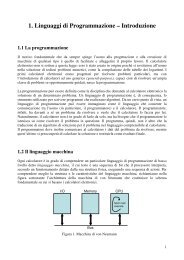
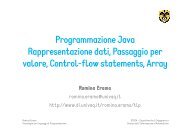
![[-a] [pathname…] - Informatica - Università degli Studi dell'Aquila](https://img.yumpu.com/15942887/1/190x143/a-pathname-informatica-universita-degli-studi-dellaquila.jpg?quality=85)

